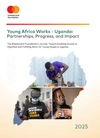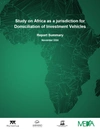A new study with our partners at Laterite maps the EdTech landscape in the country
EdTech in Rwanda is at an early but promising stage. The COVID-19 pandemic was a catalyst for EdTech in the country and showed that it could play a critical role in supporting and facilitating education at scale. Now is the time to build on this momentum to create a strong and inclusive EdTech industry in the country.
At this important stage, Laterite, in partnership with the Mastercard Foundation, has prepared a new report that maps the state of the EdTech ecosystem in Rwanda. It outlines the major EdTech initiatives and players, the Rwandan EdTech policy environment, and key opportunities for EdTech. It also highlights factors that constrain or enable the development of a robust EdTech ecosystem in the country.
The report draws on qualitative interviews with 34 EdTech stakeholders in Rwanda, as well as discussions and reflections from a workshop held in Kigali in November 2022 hosted by the Mastercard Foundation with the Ministry of Education, Rwanda Basic Education Board, and the Rwanda ICT Chamber. The workshop brought together more than 80 EdTech stakeholders representing the government, development partners, private companies and schools.
EdTech in Rwanda: Six key points from the report
- There is ongoing momentum to create a strong and inclusive EdTech industry in Rwanda, with buy-in at all levels.
- EdTech is a complex ecosystem that relies on several enabling factors, including a supportive policy environment; access to devices for end-users such as smartphones; availability of infrastructure such as internet and electricity; and a workforce with the skills to create digital learning content.
- EdTech firms – especially local firms – want to be consulted on EdTech policy.
- A framework is needed to facilitate collaboration between government and EdTech stakeholders; and among stakeholders within the EdTech ecosystem.
- Clarity around approval processes, standards and procurement rules related to using EdTech in the education system will make these processes more predictable and efficient for EdTech firms.
- EdTech policy and solutions should proactively address the diversity of users and their needs: there is no ‘one-size-fits-all.’
These findings are important for the many players working to benefit learners by developing the EdTech sector in Rwanda.




